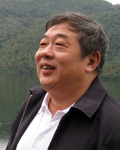|
 |
|
Li Lulu | "Compared to our generation, the youth of today have fewer ideals. Ideals are not necessarily concerned with material life—some people have little money, but live rich spiritual lives," Li Lulu, a Chinese sociologist and Vice Dean of the School of Sociology and Population Studies at Renmin University of China, told Beijing Review.
Born in 1954, Li has lived witnessed the abundant changes in Chinese society over the past decades.
School days
"When I was in fifth grade, we stopped having classes after a long summer vacation. Every day, we would go to the streets and watch leaflets being spread and posters put up," Li said. "Society was crazy at that time; every work unit was busy criticizing its leaders."
"Students who joined Red Guard organizations soon started taking free public transport across the country to spread revolutionary ideas. Many came to Beijing, where Chairman Mao met them at Tian'anmen Square eight times," he said.
Li's time at school was interrupted by the "cultural revolution" (1966-76), a sociopolitical movement set into motion by Chairman Mao, founding father of the People's Republic of China.
Red Guards consisted of university and high school students who spontaneously formed organized units wearing green jackets, similar to Chinese army uniforms at the time, with red armbands attached to one sleeve.
"Chairman Mao initiated the campaign to prevent the restoration of capitalism. He wanted to keep China from following the Soviet Union, which had failed to eliminate revisionism and was forced to see the rise of a new hierarchy."
It was a time of upheaval, but also one of ideals, both in terms of politics and values. "People were really pursuing something," Li recalled.
Li, objecting to allegations that the "cultural revolution" was the outcome of Chairman Mao's power struggles, holds that it was an inevitable outcome of the age. After the Communist Party of China gained power in 1949, it gradually formed its own interests. In the meantime, economic construction necessitated efficiency, with outstanding workers encouraged financially, which in turn led to social stratification.
In 1966, Chinese school education was halted at the height of the "cultural revolution," only to resume again in 1968. High school and university education were not formally restored until 1977. When Li completed junior middle school in 1970, he became a worker at a local radio factory, the proudest occupation of the time, where he spent the next eight years until young people could enter university after passing entrance exams in late 1977.
"All my peers went to factories," he said. "It was painful work for a 16-year-old. We produced parts for radios, and I had to sit in front of an electron microscope for eight hours a day," said Li.
Unforgettable age
Despite working a monotonous job, Li's passion for philosophy never faded. In 1978, he became a student at the School of Philosophy in Renmin University of China in Beijing.
"The age following 1978 is the time I miss most," Li noted.
| 